|
|
|
Sort Order |
|
|
|
Items / Page
|
|
|
|
|
|
|
| Srl | Item |
| 1 |
ID:
121533
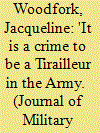

|
|
|
|
|
| Publication |
2013.
|
| Summary/Abstract |
Uniquely among European colonies, some indigenous inhabitants of the French West African colony of Senegal were made citizens of the metropole in the nineteenth century. This originaire status, as it was known, allowed them to, among other things, elect a member of the French parliament in Paris. But, the civil status of the colonial population of Senegal also influenced how its members who served in France's West African colonial army, the Tirailleurs sénégalais, were fed, clothed, housed, and paid. Using oral and archival sources, this article looks at how this cleavage between citizens and subjects influenced the relationship of Senegalese soldiers to the colonial state, the military, their officers, and each other.
|
|
|
|
|
|
|
|
|
|
|
|
|
|
|
|
| 2 |
ID:
179337
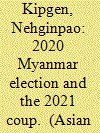

|
|
|
|
|
| Summary/Abstract |
In the 2020 general election, the National League for Democracy (NLD) won 920 of the total 1,117 seats, which was upped by 61 seats from its win in the 2015 election. The main opposition party, the Union Solidarity and Development Party (USDP), won 71 seats, down 46 from the 2015 election when it won 117 seats. The election result gave a strong mandate to the NLD for another five years. On the other hand, the USDP accused the NLD of engaging in electoral fraud including the buying of votes, and called for fresh elections in coordination with the military. Following a complaint from its proxy party, the USDP, the military initially said it would conduct an investigation in 218 townships where the military personnel and their family members cast their votes, which it expanded to 314 townships in all states and regions across the country; this finally led to the declaration of a state of emergency rule (the military coup) on 1 February 2021. Ethnic parties also alleged that the NLD government made certain pre-poll decisions that disadvantaged the ethnic minorities. This paper analyzes the electoral process and its outcome in an attempt to understand whether the election led to the deepening of democracy or the widening of division in the country's democratization process.
|
|
|
|
|
|
|
|
|
|
|
|
|
|
|
|
| 3 |
ID:
085257
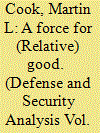

|
|
|
| 4 |
ID:
109399
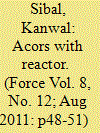

|
|
|
| 5 |
ID:
093981
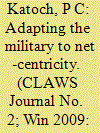

|
|
|
| 6 |
ID:
103817


|
|
|
|
|
| Publication |
New Delhi, IDSA, 2011.
|
| Description |
51p.
|
| Series |
IDSA occasional paper no. 17
|
| Standard Number |
9798186019871
|
|
|
|
|
|
|
|
|
|
|
|
Copies: C:2/I:0,R:0,Q:0
Circulation
| Accession# | Call# | Current Location | Status | Policy | Location |
| 055886 | 355.1/DIX 055886 | Main | On Shelf | General | |
| 055887 | 355.1/DIX 055887 | Main | On Shelf | General | |
|
|
|
|
| 7 |
ID:
086169
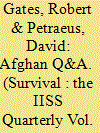

|
|
|
|
|
| Publication |
2009.
|
| Summary/Abstract |
My question is about Afghanistan. You described the challenges and some of the responses, but I would like you to go into more detail about what you expect other nations to contribute in military terms. Since I am a European, what would you expect European partners and allies of the United States to be contributing? More generally, what would you consider to be the appropriate balance, the appropriate policy mix, between the military surge on the one hand, and the political and economic efforts in Afghanistan and in the region on the other hand?
|
|
|
|
|
|
|
|
|
|
|
|
|
|
|
|
| 8 |
ID:
091297
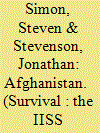

|
|
|
|
|
| Publication |
2009.
|
| Summary/Abstract |
US President Barack Obama's current policy favours escalation in Afghanistan. The idea is that as the United States' military presence in Iraq is drawn down, the use of force can be refocused on Afghanistan to forge a more viable state. The principal instruments of this policy are more American troops with better force protection (a customised version of the counter-insurgency 'surge' employed with ostensible success in Iraq) and firmer bilateral diplomacy with Pakistan. The administration's policy appears to be overdetermined. The premise of the policy is that the United States must 'own' Afghanistan in order to defend its strategic interests. But that premise begs the question of whether US strategic interests actually require the United States to assume the grand and onerous responsibility of rebuilding the Afghan state. They do not.
|
|
|
|
|
|
|
|
|
|
|
|
|
|
|
|
| 9 |
ID:
090983
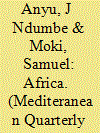

|
|
|
|
|
| Publication |
2009.
|
| Summary/Abstract |
The authors contend that the pervasiveness of piracy on the African coasts is threatening global security. Within Somalia, it is causing a disruption of food supplies, fostering internal conflict, and increasing the prices of basic commodities. Globally, it is orchestrating a dramatic rise in maritime insurance premiums and maritime insecurity, disrupting international commerce, increasing the possibility of an environmental disaster, and encouraging a nervous, emerging relationship with terrorism. Piracy must be stopped. To achieve this objective, the authors recommend revamping the international law on piracy, maintaining adequate coastal security along the hot spots on the African coasts, using military force, establishing safe maritime lanes, training crews on security measures, stationing armed guards on ships, and most importantly, reestablishing political stability in Somalia.
|
|
|
|
|
|
|
|
|
|
|
|
|
|
|
|
| 10 |
ID:
107222
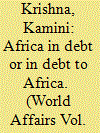

|
|
|
| 11 |
ID:
109330
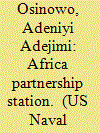

|
|
|
| 12 |
ID:
032956
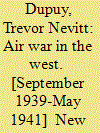

|
|
|
|
|
| Publication |
New York, Franklem Watts, Inc., 1963.
|
| Description |
76p.Hbk
|
| Series |
Military History of World War II
|
| Contents |
Vol. VI
|
|
|
|
|
|
|
|
|
|
|
|
Copies: C:1/I:0,R:0,Q:0
Circulation
| Accession# | Call# | Current Location | Status | Policy | Location |
| 008098 | 940.54/DUP 008098 | Main | On Shelf | General | |
|
|
|
|
| 13 |
ID:
115936
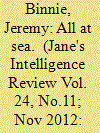

|
|
|
| 14 |
ID:
107331
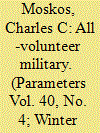

|
|
|
| 15 |
ID:
117619
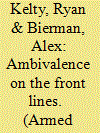

|
|
|
|
|
| Publication |
2013.
|
| Summary/Abstract |
In the past several decades, the US military has increasingly relied on civilian contractors to provide a variety of core functions. Lagging behind this increased reliance on contractors is an understanding of how the presence of contractors influences civilian and military personnel. This research addresses this question using a unique study of US Department of Army civilians and military personnel serving in Iraq and Afghanistan. We find a substantial degree of ambivalence among both groups regarding the impact of contractors on the military and comparisons with contractors, but we also find a noticeable trend of comparative discontent beneath this apparent ambivalence. Results are discussed in the context of using ambivalence as a starting point for building a theoretical approach to more systematically understanding the role and effects of contractor integration in the military.
|
|
|
|
|
|
|
|
|
|
|
|
|
|
|
|
| 16 |
ID:
114022


|
|
|
|
|
| Publication |
2012.
|
| Summary/Abstract |
American military institutions importantly shaped the popular sport of college football. From support at its two oldest service academies, interest in football spread through military units across the country with military actors involved in the formation of the country's first collegiate athletic conference and the National Collegiate Athletic Association. Subsequently, the US military functioned as an agent of authoritative diffusion, fostering interest in college football after the First World War. Furthermore, military institutions, including the draft, affected not only which team would be most successful during the Second World War but also how civilians would play the game. These effects call to mind Charles Tilly's work on state formation and security-driven resource extraction as well as Harold Lasswell's garrison state idea.
|
|
|
|
|
|
|
|
|
|
|
|
|
|
|
|
| 17 |
ID:
079164
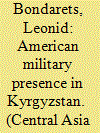

|
|
|
| 18 |
ID:
104485
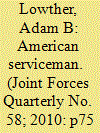

|
|
|
| 19 |
ID:
138289
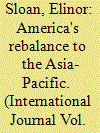

|
|
|
|
|
| Summary/Abstract |
This paper examines the impact of the US pivot to the Asia-Pacific on Canada’s strategic thinking and maritime posture. It highlights elements of the US rebalance before examining Canada’s recent past, present, and future strategic and military engagement. Canada wants to be able to contribute to crisis de-escalation if regional tensions lead to conflict, yet the Royal Canadian Navy has less deployment capacity today than it has had in 25 years. To contribute to mediatory influence, and provide warfighting capability, a recapitalized navy should increase deployments to the region, forward deploy some naval assets, and ensure interoperability with its US counterpart. In the event of a crisis, a choice might have to be made between a neutral, honest-broker stance and a more likely decision to contribute forces to a US-led coalition. The first step in either case is to be in the Asia-Pacific region with capable and credible naval forces.
|
|
|
|
|
|
|
|
|
|
|
|
|
|
|
|
| 20 |
ID:
063114
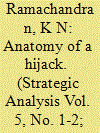

|
|
|
|
|
| Publication |
Apr-May 1981.
|
|
|
|
|
|
|
|
|
|
|
|
|
|
|
|
|
|
|
|
|